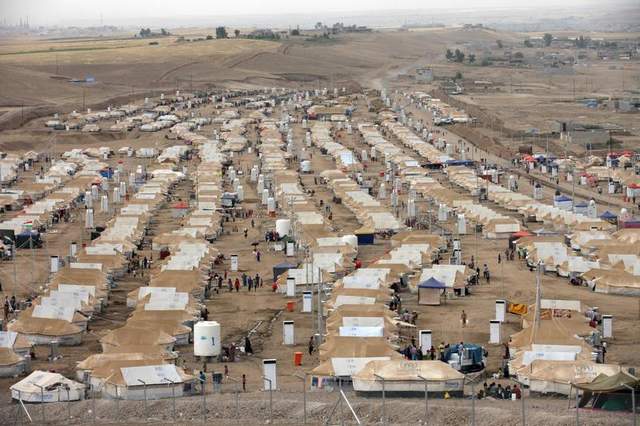
Although the Iraqi Christians who escaped the bloody hands of the Islamic State are no doubt happy and thanking God for their deliverance, their safety and total protection are not yet finished.
According to Catholic Culture.Org, the refugees who left their homes in the wake of the terrorist advance are, "pressuring religious and political leaders to find a way for a rapid mass exodus out of Iraq," according to a report from the Assyrian International News Agency.
Refugees are dying daily in the Kurdish capital of Erbil where more than 500,000 are reportedly staying, in parks and on sidewalks, and in makeshift tents. Many are left to die because of a lack of resources in the heat that sometimes tops 100 degrees fahrenheit.
"Large numbers of families are still sleeping on sidewalks and parks, and there is the fear this situation and their plight will extend into winter," according to the report.
According to Catholic Online, A delegation of Priest sent to Erbil on a fact finding mission found the conditions there to be deplorable.
The head of the delegation, Father Rami Wakim met with scores of Syrian and Iraqi refugees, and found them to be disappointed and angry with the Iraqi government that left them to the wolves.
"The people are angry because the government just gave up on them," Father Wakim said. "They told us that, in Mosul, where there had normally been a presence of 60,000 soldiers, after the onslaught of ISIS, in only a matter of hours, these soldiers abandoned them, laying down their weapons."
According to many of the refugees and other observers, Mosul, one of the largest cities in Iraq, is now completely empty of Christians as is Qaraqosh, a town dating back to 1,000 years before Christ and inhabited by mostly Christians for 2,000 years.
Displaced Iraqis have put their trust in church leaders and are leaning heavily on their own faith, and are thankful for every shred of decency that is sent their way.
To be near so many who were thankful and desperate was a moving experience for the priest.
They visited Churches where up to 50 people would be sleeping in a room the size of a bedroom, and saw church grounds covered with tents and hoards of people sharing too little space.
"It was very touching. The Melkite patriarch cried many times when he saw these people. He was hugging and kissing them as he cried. Of course, I cried, too. I think all the patriarchs cried because they felt helpless, there was nothing they could do at that very moment," even though they came laden with funds from church collections and donors, Wakim said.

The Priest came together to plead in unison for all of the human beings who were being persecuted, not just the Christians. Father Wakim said the duty of a priest was "heavy" at this time, especially in the middle east.
His comments followed what the Vatican has been voicing lately, that now is a time for words, but also a time for action.
According to Asharq Al-Awsat, the influx of refugees is putting a large burden on a city that was once known for its appeal to tourist.
Speaking exclusively to Asharq Al-Awsat, the governor of Erbil, Nawzad Hadi, said that the city was struggling to cope with almost half a million refugees.
"The total number of Iraqi refugees in Erbil alone has exceeded the 400,000 mark and [they] are distributed inside and outside the capital," he said. According to the governor, Kurdish officials see it as their moral duty to receive Iraqi refugees, but Hadi did not deny that their steady influx over the last few weeks was beginning to "burden services in the region."
Though the city faces serious problems, many of the displaced say they have been welcomed and cared for, according to the article.
"The people of Erbil in general, and Shaqlawah in particular, treat us well and generously, [they] help strangers and those in need," Diyaa Jameel said.
Jameel escaped Fallujah with his family when gunmen took control of the city.


















